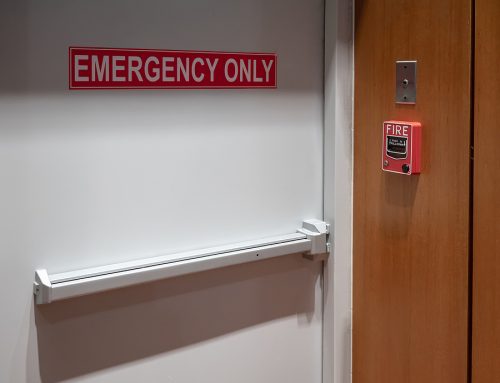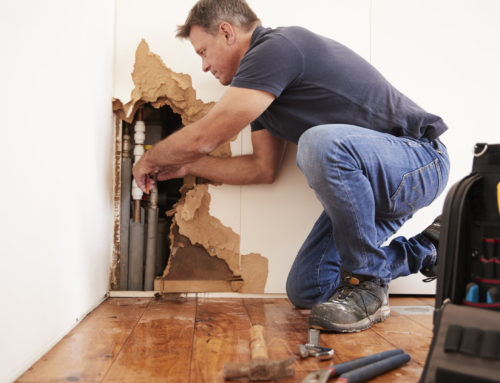A breakdown or rupture of your hot water heater can be a nuisance and a disruption in your household, no matter what time of day. It requires immediate attention and some quick thinking to get the leak stopped, and to schedule a service repair.
So how do you avoid it? How do you know the signs that your hot water heater is on the fritz? Here are a few things that may signal it is time to replace your water heater, or have a professional provide a service check:
-Your hot water heater is more than 10 years old. Most standard hot water heaters have a warranty period of 6 or 10 years. With proper care they can last longer. However, by the tenth year, you should check it more frequently – or replace it.
-The water flowing from your faucet looks rusty or not as clean as it used to be. This is a sign that your water heater is rusting away on the inside.
-The temperature of your hot water has diminished. This may be a sign your water heater may have sediment build up or the ignition system is faulty. A defective or “lazy” gas valve or a faulty heating element can cause the water temperature to drop below set temperatures.
-The hot water has a metallic smell or taste. This is also a sign that the interior of your water heater is starting to break down.
-Your water heater makes loud cracks or pops. This is a sign that sediment may have built up to the point where it has formed a mass in your water heater, and the heating process is creating noises.
– There are burn marks or soot on the water heater, indicating a potential problem with the venting or flue pipe. As this is potentially dangerous to your well-being, this should be addressed by a professional immediately.
-There is condensation on top of or around your water heater. This may indicate flue spillage or carbon monoxide escaping due to improper drafter of the water heater. This is a dangerous condition and needs to be addressed immediately. A slight fracture in your tank can also produce condensation on top of or around your water heater. This can be an indication that your heater is about to rupture.
Every water heater has a label which states the manufacturer, the model number and serial number. The model number provides information about the type of hot water heater you have, and the warranty period the manufacturer provided with your unit. The serial number tells the age of your water heater. Consumers can go online to the manufacturer’s website or call the “800” number for warranty information.
A water heaters lifespan depends on several factors. Water quality, water temperature and how often maintenance is provided, all contribute to the life expectancy of your water heater. The more sediment contained in the water that enters the hot water heater, the more damage it can do to your unit.
It is a good idea to check your water heater at least once a year, more frequently if it is older. Consider hiring a professional for a maintenance check. Routine preventive maintenance can extend your water heater lifespan and keep its efficiency and operational safety longer than without service. Whether or not you use a professional, the first sign of a leak should be a call to action to have it replaced.
In today’s marketplace, there are many options for your domestic hot water needs. If high efficiency is a priority, consider a tankless hot water heater, however, the initial cost is more than a standard heater. This is because the equipment itself is more expensive. Furthermore tankless heaters require a fresh air inlet into the unit and a direct exhaust vent from the unit to the outside – approximately four feet from any doors, windows and walkways. Gas and water piping may also need to be altered to comply with the manufacturer’s installation requirements and NYC Department of Buildings Plumbing Code.
Tankless water heaters are much smaller than standard heaters, and can be mounted on any wall of your home, including an exterior wall. Tankless heaters provide continuous domestic hot water service without the bulky storage tank.
When sizing any type of hot water heater careful consideration should be given to how many people reside in the home and how many hot water fixtures are in the building.
With the new “Gas Code” in effect, you technically need to file a plumbing permit (LAA) with the NYC Department of Buildings, if any new gas pipe is being installed and/or moving the existing gas isolation valve for that unit.
If you suspect there is something wrong with your hot water heater, consult with a professional. Knowledgeable technicians can provide you with the proper diagnostic of your water heater and provide options to repair or replace your equipment. Furthermore, they can provide more detailed information about the type of equipment that would best suit your home.
As with all home improvements or home repair services, make sure you select a company that is licensed and insured to do work in New York City, and who is capable of providing the services you need. Ask for references and check their reviews online to ensure their customers are satisfied with the services they were provided.
Paul Buttermark, Vice President Louis L. Buttermark & Sons Plumbing
(718) 351-4220



